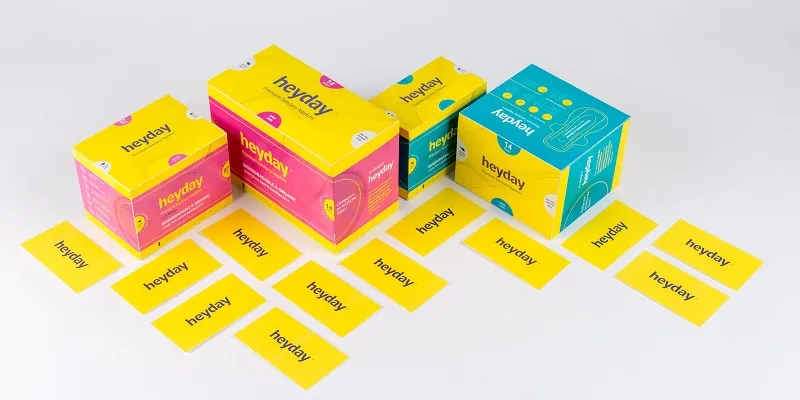Earth Day 2022: 5 startups championing the cause of biodegradable sanitary napkins
On Earth Day 2022, we bring you a list of startups that are working towards promoting biodegradable sanitary napkins to serve women and the planet better.
The environment friendly sanitary napkin market in India has seen a steady rise in recent years. Although the topic of menstruation is still taboo in the country, increased awareness has led to a shifting mindset - leading to guidelines, waste management practices, and menstruation products being innovated to serve women and the planet better.
Biodegradable napkins have become popular not just for their environment-friendly feature, but also its health benefits. With improper use, the plastic in sanitary napkins has been known to cause bacterial and fungal infections, leading to pelvic inflammatory diseases and other health complications. Several reports have also pointed to how millions of tonnes of sanitary waste clog the sewage drains, with plastic being the number one culprit here.
Biodegradable sanitary napkins made from organic cotton, banana fiber, corn starch, and water hyacinth, etc., are popular for their comfortable, skin-friendly texture, cost-effectiveness, and the capacity to absorb blood adequately.
Additionally, several government schemes and programmes, and improved distribution channels have also contributed to boosting this market size to what it is now.
According to IMARC, the Indian biodegradable sanitary napkin market reached a value of around $10 million in 2020, and it expects it to grow at a CAGR of 33.40 percent between 2021-2026.
On this Earth Day, YourStory lists five startups disrupting the fairly crowded biodegradable sanitary napkin industry with their unique solutions.
Noraa
Founded in 2019 by Hemender Hoon and Ayush Chandel, Gurugram-based is an organic and biodegradable sanitary napkin brand. With an all-women manufacturing unit, the startup aims to build an ecosystem for menstrual hygiene to help women have a worry-free period.
The products have five layers made of cornstarch and woven-cotton and sap powder core. The startup claims these products are rash-free and chemical-free pads, also it starts degrading in 6 months and completely degrades in 24 months.
“In rural areas, everyone knows that they do not have the luxury of a fancy pad. Even in urban areas, the lack of menstrual awareness was very disconcerting. I never imagined that even in a city like Kolkata, people would not discuss basic hygiene points,” says Hemender.
Avni
Founded by husband-wife duo Sujata Pawar and Apurv Agarwal in 2020, Thane-based holistic menstrual care solutions offers innovative and eco-friendly menstrual care products for women.
The startup has eco-friendly products such as reusable and organic sanitary pads as well as cotton
disposable pads.
Avni also offers menstrual cups designed with medical-grade silicon and combo offer to its customers called the ‘Green Period Kit’. The products are available online on ecommerce platforms such as Amazon, Qtrove, Flipkart, Upciclo, ThePinkBox, 1MG, and Shycart.
“We launched Avni with our first core product, Avni Safepad, being antimicrobial, reusable, and organic cotton sanitary pads. It has been designed with three layers of high-performance fabrics and antimicrobial technology to keep women safe from infections. The product is not only safe for women, but also for the environment as it is organic and reusable for up to three years,” Sujata says.
FabPad
Founded by Upasana Todi Prakash and Shripriya Khaitan Dhelia in 2021, Kolkata-based startup manufactures healthy, eco-friendly, affordable, and reusable alternatives to feminine hygiene products.
It offers products such as menstrual cups, organic cotton disposable sanitary napkins, reusable cloth pantyliners, reusable cloth pads, period panites, reusable cloth diapers for babies.
The startup is on a mission to build eco-friendly and hygienic menstrual solutions that will be available to women everywhere, and it also aims to empower women with employment opportunities and impact the environment.
“Though we knew that this is a fairly crowded space, we had two main objectives when we started FabPad. To do our bit to save the environment and to address period poverty in India, we wanted to offer the basic privilege of wellness, self-care and hygiene to women everywhere,” remarks Shripriya.
The products are available on ecommerce platforms such as Meesho, Jio Mart, Big Basket, Amazon, Nykaa, Flipkart, and its own website.
Heyday
Founded in 2017 by Deepanjali Kanoria, Gurugram-based is a sustainable brand that produces menstrual hygiene products and baby diapers manufactured in-house using plant fibre weaves with zero toxins, plastics and chemicals.

It offers eco-friendly products such as panty liners, menstrual cups, biodegradable sanitary pads, and baby diapers.
“The products are completely biodegradable within two years of disposal. For women and children, they offer a safer, softer, and healthier way of experiencing hygiene that is good for the body and the planet,” says Deepanjali
Plush
Founded in 2019 by Prince Kapoor and Ketan Munoth, Chennai-based feminine startup produces menstrual cups, sanitary napkins, and women razors.
The startup claims to be sustainable compared to other incumbent brands in the market. It uses 100 percent pure cotton, and the products are rash-free, certified by PETA, FCS, Seal of Cotton, and Cotton USA. They are available on online platforms such as Nykaa, Amazon and offline at More, Health & Glow, and Namdhari’s.
“When we visited a supermarket and found that there is an abundant choice in every category except the femme care segment, it was the trigger point for us to get into something deeper and talk to existing consumers. We got into a lot more detail, and realised that in the period care space, there is a massive gap,” says Prince.
Edited by Anju Narayanan








